NordVPN vs PrivateVPN Review 2025: Which VPN is Better?
Choosing between NordVPN and PrivateVPN is difficult as both are top options in the VPN industry. To find out the better pick overall, I pitted them against each other and tested them extensively across several domains.
After comparing the VPNs in 13 categories, NordVPN outperformed PrivateVPN in most aspects. It has a much more extensive network with specialty connections for enhanced privacy and advanced features like dark web monitoring and even a password manager.
Although slightly costlier, NordVPN justifies its price tag with its top-notch features and performance. Overall, it’s a better option than PrivateVPN. You can try it risk-free with its 30-day money-back guarantee.
Editor’s Note: We value our relationship with our readers, and we strive to earn your trust through transparency and integrity. We are in the same ownership group as some of the industry-leading products reviewed on this site: ExpressVPN, Cyberghost, Private Internet Access, and Intego. However, this does not affect our review process, as we adhere to a strict testing methodology.
No Time? Here’s a 1-Minute Summary of Category Winners
 |
||
| Pricing | Has slightly more expensive monthly plans but is cheaper on long-term deals | Has more affordable monthly plans, but long-term packages aren’t as good value |
| Streaming | Works with 13 Netflix libraries and other sites like Hulu, Disney+, and Max | Works with 10 Netflix libraries and other platforms such as 9Now and Crunchyroll |
| Servers | 7,287+ servers in 118 countries with P2P, Tor, and Double VPN specialty connections | 200+ servers in 63 countries with no specialty connections |
| Speed | Local servers dipped baseline speeds by 2%, while distant ones did so by 14% | Local servers reduced speeds by 4%, whereas distant locations were up to 18% slower |
| Security | Includes LAN Invisibility, military-grade encryption, Meshnet, dark web monitoring, double VPN, and RAM-only servers | Includes military-grade encryption, free dedicated IP addresses, and RAM-only servers |
| Torrenting | Offers special P2P servers in 50+ countries | Allows P2P traffic on all its servers and includes port forwarding |
| China | Doesn’t reliably work in China but has obfuscated servers that work in mildly restrictive locations like Turkey | Offers ‘Stealth VPN’ that uses Shadowsocks-based obfuscation and works in China |
| Gaming | Yielded an average ping of 29ms on local servers and 51ms on distant ones | Averaged ping of 33ms on local servers and 57 on distant ones |
| Device Compatibility | Supports 10 simultaneous connections and includes Smart DNS for VPN-incompatible devices | Supports 10 simultaneous connections but doesn’t have Smart DNS |
| Company Jurisdiction | Based in Panama and isn’t bound by data retention laws | Based in Sweden, which is part of the 14 Eyes Alliance |
| Privacy Policy | Doesn’t record any data, and its no-logs policy is audited by PwC | It has a no-logs policy, which hasn’t been independently audited |
| Payments and Refunds | Accepts all popular payment methods and even allows anonymous payments through cryptocurrencies | Accepts many payment types and allows anonymous sign-up using cryptocurrency |
| Customer Support | Provides support through live chat, email, in-app ticketing, and online guides | Support options include live chat, email, remote assistance, and a knowledge base |
13 Categories of Comparison for NordVPN vs PrivateVPN
NordVPN turned out to be the better overall contender in this comparison. It has the advantage of a much larger network and offers several security and privacy features like dark web monitoring and double VPN servers. Here’s a breakdown of what each category covered:
- Pricing — compared the pricing structures and plans of each VPN to determine which offers the best value for money.
- Streaming — conducted tests on various servers with streaming services like Netflix, Max, Hulu, etc., to assess the availability of effective IP addresses.
- Servers — examined the total number of servers, their geographic distribution, and their effectiveness in providing secure connections across different countries.
- Speed — evaluated the connection speeds on local and remote servers to see if they suit high-bandwidth activities.
- Security — investigated each VPN’s security features, including the strength of encryption, types of security protocols used, and protection against data leaks.
- Torrenting — checked if each VPN has P2P-optimized servers and compared their performance on nearby and distant servers.
- China — assessed if the VPNs work in China, focusing on the availability of obfuscated servers to counter deep packet inspection.
- Gaming — tested each VPN’s impact on ping and server stability to determine its suitability for online gaming.
- Device Compatibility — reviewed the ease of setup, user interface across various apps, and the number of simultaneous device connections supported.
- Company Jurisdiction — researched the location of each VPN’s headquarters to understand if they fall under any data retention laws.
- Privacy Policy — scrutinized the privacy policies of the VPNs to determine the extent of data collection and if no-logs policies have been audited.
- Payments and Refunds — explored the payment options available, the process and ease of filing for a refund, and the time it took to get my money back.
- Customer Support — tested all available support channels, assessing the VPNs based on the timeliness and usefulness of their responses.
1. Pricing — NordVPN Is Marginally More Expensive but Offers Better Value
While it’s more expensive, NordVPN offers better long-term pricing and value for money overall. The price difference is the most on the monthly plan, but PrivateVPN’s 3-month plan costs the same per month as NordVPN’s Plus plan for 1 year. Here’s a detailed comparison of prices:
| NordVPN | PrivateVPN | |
| Best Deal | a month on the 2-year + 3 months plan | $2.00 a month on the 3-year plan |
| Monthly Plan | $12.99 per month | $9.90 per month |
| 3-Month Plan | ✘ | $6.00 per month |
| 1-Year Plan | $4.99 per month | ✘ |
| 2-Year Plan | per month | N/A |
| 3-Year Plan | ✘ | $2.00 per month |
| Free Trial | 7-day free trial on mobile devices | 7-day free trial on Android |
| Money-Back Guarantee | 30 days | 30 days |
Unlike PrivateVPN, NordVPN offers 3 plans on each duration tier — Standard, Plus, and Complete. The pricing in the table above is for its Standard plan, which is the VPN service. With ‘Plus,’ you get a cross-platform password manager and a data breach scanner, and ‘Complete’ equips you with ‘Next Gen File Encryption’ and 1TB of cloud storage
If you want to save a couple of bucks on the monthly plan, you can choose PrivateVPN. While NordVPN’s yearly plan is more affordable, both VPNs deserve to be listed in the most affordable monthly VPNs list. Note that PrivateVPN’s renewal prices remain the same, but NordVPN’s are almost double, so it’s best to get its long-term plan.
Pricing Winner: NordVPN
2. Streaming — NordVPN’s SmartPlay Lets You Stream Even on Incompatible Devices
NordVPN is the better choice for streaming because of SmartPlay. It combines a VPN’s security with the speed and agility of a Smart DNS. This feature also lets you stream on devices that don’t natively support VPN apps, like gaming consoles and non-Android smart TVs. With SmartPlay, you can stream on Netflix US and over 400 platforms like:
| Netflix | BBC iPlayer | DAZN | Paramoun+ |
| Amazon Prime Video | Disney+ | ITV Hub | Crunchyroll |
| Hulu | Max | RTL | ESPN |
My global team of testers found that NordVPN works with 13 different Netflix libraries, including the US, UK, Canada, Japan, the Netherlands, and India. They didn’t get the Netflix proxy error or face buffering during UHD streams on their local libraries.

Unlike NordVPN, PrivateVPN doesn’t have Smart DNS, so you can’t stream on consoles and other incompatible devices. However, you can set it up on your router to protect all your home devices. You’ll need a compatible router like AsusRT, Synology, and DD-WRT.
My colleagues confirmed that PrivateVPN works with 10 international Netflix libraries. Despite some inconsistencies, like the absence of a Helsinki server, the tester in Finland used a server in Espoo instead. Similarly, a colleague in the Czech Republic streamed their local Netflix library even though PrivateVPN doesn’t have a Netflix-compatible server there.

Both VPNs are great for streaming, but NordVPN has a slight edge because of SmartPlay. It also works with a larger range of platforms due to its more extensive network. However, PrivateVPN checks all the boxes for streaming, too, and isn’t a bad choice.
Important! Changing your location with a VPN to access geo-restricted foreign content unavailable in your region could violate copyrights and terms of service. I don’t condone using a VPN for this purpose.
Streaming Winner: NordVPN
3. Servers — NordVPN Has a Larger Network With Specialized Connections for Privacy
NordVPN wins this round due to its sheer network size. It also offers specialty connections like obfuscated, double VPN, Onion over VPN, and P2P servers. You can select these categories through the globe icon on the left pane. In contrast, PrivateVPN’s network is comparatively smaller.
| NordVPN | PrivateVPN | |
| Server Number | 7,287 | 200 |
| Server Countries | 118 | 63 |
Its 10Gbps servers offer ample bandwidth for data-intensive tasks and better reliability. All of NordVPN’s network comprises diskless servers that run on volatile RAM and can’t store data. It’s also gradually switching to colocated servers, owned and run entirely by NordVPN, to reduce third-party interference. Plus, NordVPN’s specialty servers include:
- Double VPN — route your data through 2 servers to double the encryption. This makes stealing your data extremely difficult.
- Onion over VPN — transfers your traffic through NordVPN’s servers and the Tor network for added privacy.
- Obfuscated servers — disguise your VPN data as regular, non-VPN traffic to get past anti-VPN filters and firewalls.
- P2P servers — are built explicitly for torrenting in 50+ P2P-friendly countries (standard servers don’t allow torrenting).
- Dedicated IP — assign you a unique IP address dedicated to you for a small additional fee.
While it doesn’t have specialty servers, PrivateVPN includes dedicated IP servers for free. Dedicated IP addresses are less likely to be detected by anti-VPN filters and are better for IP-sensitive tasks like online banking. PrivateVPN owns and operates all its dedicated IP servers to prevent potential data mishandling by third parties.
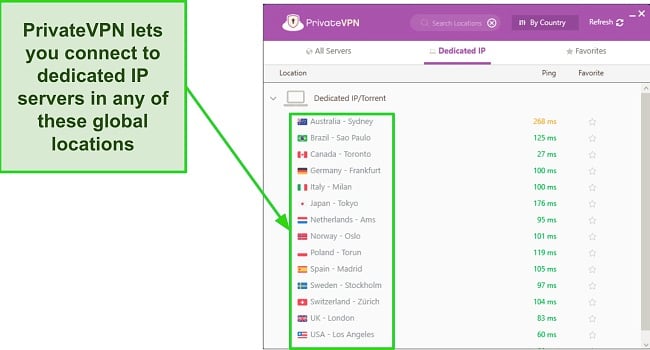
PrivateVPN’s servers weren’t congested in my tests despite the smaller network. But I still prefer having more servers with NordVPN. I wish NordVPN had free dedicated IP addresses, although it’s a small lacking I can overlook. I still prefer ExpressVPN because it has one of the widest server spreads with its 3,300+ servers in 105 countries.
Servers Winner: NordVPN
4. Speed — NordVPN Is Slightly Faster on Local and Distant Servers
In my tests, NordVPN was a bit faster on local, mid-range, and distant servers. The difference in numbers wasn’t noticeable. I streamed Legendary Animals, a UHD nature film on YouTube, without buffering with both VPNs. PrivateVPN’s distant servers in the US were slightly slower to load the video. I recorded the speeds of both VPNs in the table below.
| Speed on local servers | Speed on US servers (7,000+ miles) | Speed on UK servers (4,000+ miles) | Bufferless UHD streaming on YouTube | |
| NordVPN | 98Mbps | 86Mbps | 88Mbps | ✔ |
| PrivateVPN | 96Mbps | 82Mbps | 85Mbps | ✔ |
Uploading a 500MB video on Instagram was 15 seconds faster with NordVPN. However, the durations equalized when I compared NordVPN’s OpenVPN protocol with PrivateVPN’s IKEv2, which is faster and more compatible with smartphones. It wasn’t entirely fair competition because NordVPN’s proprietary NordLynx protocol is pretty efficient.
Similarly, video conferencing with my colleagues on Zoom was seamless with both VPNs. Even on distant US servers, the video quality didn’t drop nor did the connection get unstable throughout my 1-hour call. I also downloaded a 400MB work-related video in under 5 minutes with both VPNs.
While NordVPN was the technically faster contender in this category, PrivateVPN was on par with it in practical terms. Downloading and uploading files, torrenting, and streaming went just as smoothly with both VPNs. However, I have fast internet, so your experience could differ from mine.
Speed Winner: NordVPN
5. Security — NordVPN Packs More Security Features
NordVPN has more security and privacy features than PrivateVPN. It also includes advanced offerings like dark web monitoring and LAN Invisibility. In contrast, PrivateVPN checks all the necessary boxes but doesn’t go the extra mile. Here’s a chart comparing the basic security features each VPN has to offer:
| NordVPN | PrivateVPN | |
| Encryption | AES-256-GCM and ChaCha20, SHA512 | AES-256-GCM SHA256 and 2,048-bit RSA keys |
| VPN Protocols | NordLynx, OpenVPN, and IKEv2/IPSec | OpenVPN UDP, L2TP/IPSec, PPTP, and IKEv2 |
| Kill switch | Windows, macOS, Linux, iOS, and Android | ✔ |
| Leak Protection | ✔ | ✘ |
| Malware/Ad Blocker | ✔ | ✘ |
| Multi-Hop/Double VPN | ✔ | ✘ |
| Tor Over VPN Servers | ✔ | ✘ |
| Dedicated IPs | ✔ (at a small additional fee) | ✔ (for free) |
| RAM-Only Servers | ✔ | ✔ |
Beyond the basics, both VPNs have split tunneling, which lets you encrypt specific apps and not your entire traffic. With NordVPN, you get additional features such as:
- Dark web monitoring — scans for data breaches on the dark web and alerts you to change your credentials before the damage is done.
- NordPass — stores, organizes, and accesses your passwords for seamless auto-fill logins and prevents keyloggers from recording your keystrokes.
- Meshnet — lets you create a custom private network of up to 50 devices for secure file sharing and virtual LAN parties with friends.
- Invisibility on LAN — hides your device from others on the same local network to provide privacy on unsecured public networks.
NordVPN easily wins this round because of its sheer number of security and privacy features. Its advanced features, like LAN Invisibility and dark web monitoring, are seldom found on top VPNs. That said, PrivateVPN provides decent security and privacy, checking all the necessary boxes.
Security Winner: NordVPN
6. Torrenting — PrivateVPN Includes Port Forwarding for Efficient P2P Connections
NordVPN and PrivateVPN gave me similar P2P download speeds. They’re both good for torrenting; the only difference is that NordVPN allows it on specific servers, while PrivateVPN supports P2P traffic on all servers. However, NordVPN’s P2P server count is still greater than PrivateVPN’s entire network.
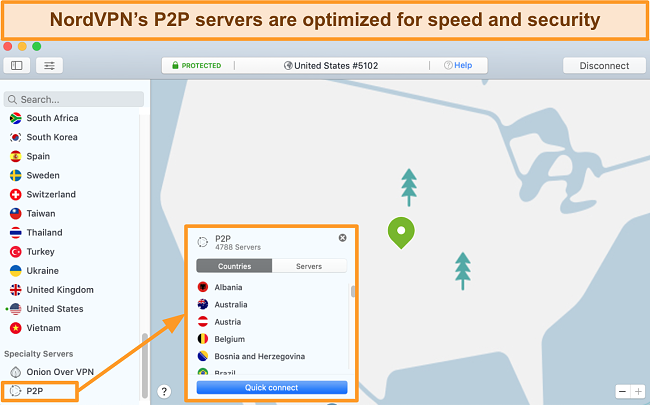
Unlike PrivateVPN, NordVPN allows torrenting on specific servers in 50+ countries. These servers are optimized for P2P traffic and fast downloads. NordVPN automatically routes you to a torrenting server if it detects that you’re trying to torrent on platforms like Popcorn Time.
PrivateVPN lets you torrent on all servers, but it can be risky in countries with unfriendly privacy laws like the US and Hong Kong. Its dedicated IP connections have open ports to enable efficient data upload and download. Here’s how the VPNs compared when downloading and uploading a 3GB file in my tests.
| Upload time (3GB file) | Download time (3GB file) | Connection stability | |
| NordVPN | 4.5 minutes | 3.5 minutes | Excellent |
| PrivateVPN | 4.2 minutes | 3.5 minutes | Excellent |
I would give both VPNs the same marks for torrenting. Still, PrivateVPN is slightly better because it includes port forwarding. By forwarding ports, you can create direct connections to more peers in the torrent swarm. This direct path bypasses the NAT firewall and enables better communication and faster data transfer rates.
Torrenting Winner: PrivateVPN
7. China — PrivateVPN’s Stealth Mode Is Powerful Enough to Work in China
Even though both VPNs have obfuscated servers, PrivateVPN is the one that reliably works in China. Its Stealth VPN mode disguises your data as regular traffic and uses the Shadowsocks protocol to hide your data packets from deep packet inspection and firewalls.
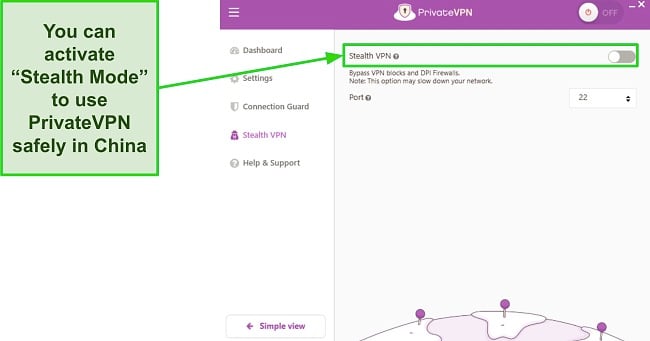
PrivateVPN has servers close to China in Hong Kong, Taiwan, and Tokyo, so you needn’t worry about speed dips. Shadowsocks isn’t the most reliable form of obfuscation, so PrivateVPN might be blocked at times by the Great Firewall. In comparison, ExpressVPN uses proprietary obfuscation technology that reliably works in China.
Overall, PrivateVPN wins this round and is one of the few VPNs that work in China. Just set up the app before going to China; otherwise, you might not be able to. While the Chinese government hasn’t penalized people and focuses on technologically blocking VPNs, I don’t condone using a VPN in countries where they’re banned.
China Winner: PrivateVPN
8. Gaming — NordVPN Is Slightly Better Due to Lower Latency
Speaking strictly from gameplay experience, both VPNs gave me lag-free gameplay. However, the actual numbers from my tests favored NordVPN, but only slightly. With a baseline ping of 22ms, I connected to each VPN’s nearby and distant servers and recorded the spike in latency. The chart below shows the ping data from my tests.
| Average ping — Local servers | Average ping — US (7,000+ miles away) | Average ping — UK (4,000+ miles away) | Lag-free gameplay | |
| NordVPN | 29ms | 51ms | 46ms | ✔ |
| PrivateVPN | 33ms | 57ms | 53ms | ✔ |
NordVPN is one of the best VPNs to play Call of Duty: Warzone and other fast-paced FPS games. Even on a mid-range server in Germany, my ping never exceeded 50ms, and I never missed a headshot due to lag.
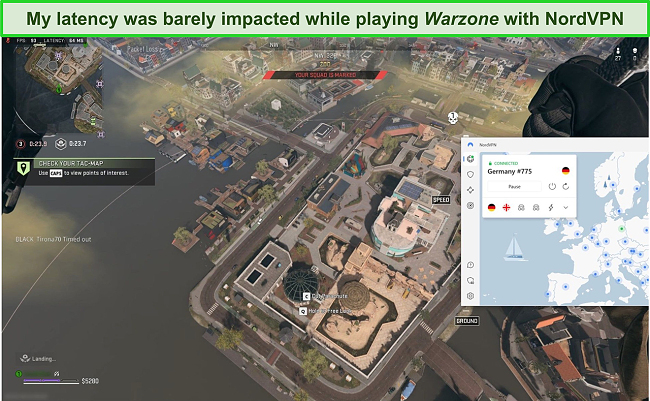
I played Counter-Strike: Global Offensive without lag on PrivateVPN’s server in Australia. Despite its slightly higher ping than NordVPN, it never went above 60ms. All servers I tested passed my DNS leak tests, so network administrators can’t throttle your speeds for uninterrupted gaming.
Overall, NordVPN slightly edges PrivateVPN in numbers, but both contenders offer an equally good gaming experience. However, CyberGhost’s gaming servers yielded lower average ping, and I’d prefer using those for playing fast-paced games where every millisecond counts.
Gaming Winner: NordVPN
9. Device Compatibility — NordVPN’s Smart DNS Makes It Compatible With a Wider Range of Devices
NordVPN wins this round because its Smart DNS lets you set up a VPN connection on smart TVs and other devices that don’t natively support VPN apps. This gives you great device flexibility. However, you can compensate for this with PrivateVPN by setting it up on your router. Encrypting your WiFi protects all your home devices that connect to it.
| NordVPN | Major platforms: Windows, macOS, Linux, iOS, and Android
Other platforms: Amazon Fire TV, Android TV, Chromebook, and Kodi Browser extensions: Chrome, Edge, Firefox, Opera, and Brave Manual setup: Gaming consoles, Roku, and routers |
| PrivateVPN | Major platforms: Windows, macOS, ChromeOS, Linux, iOS, and Android
Other platforms: Amazon Fire TV Stick, Chromecast, and Kodi Browser extensions: Not available Manual setup: Routers (compatible with AsusRT, Synology, DD-WRT, Tomato, Linksys, QNAP, and pfSense). |
You can use NordVPN on up to 10 devices simultaneously with a single subscription. Its desktop apps feature a map containing server locations. Clicking a pin on the map connected me to the corresponding server, but using the server list was easier. Its mobile apps had a similar interface, so switching to them didn’t feel like there was a learning curve.
PrivateVPN allows 10 simultaneous connections. When it comes to user experience, I found PrivateVPN’s Fire TV, Chromecast, and Kodi apps a bit quirky. For instance, the Fire TV Stick app lacks a kill switch and is ported from Android, which makes the layout a bit clunky and unoptimized. However, its mobile apps are very customizable and let you reduce encryption to 128-bit for a slight speed boost when required.
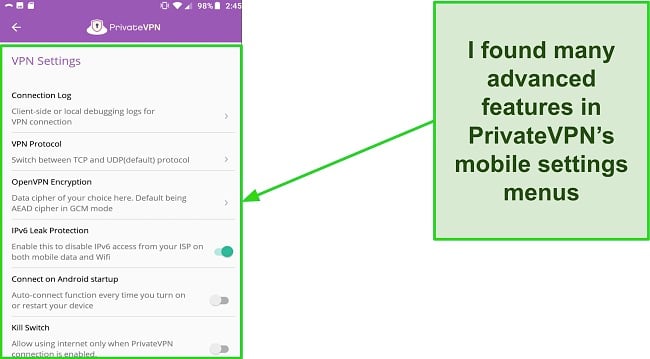
In summary, NordVPN works on a wider range of devices. While it supports fewer simultaneous devices, its 10-connection limit is enough. NordVPN’s apps also felt more complete. PrivateVPN’s iOS app lacks a crucial feature — a kill switch, while NordVPN’s mobile apps don’t have dedicated IPs and obfuscated servers (which aren’t a must-have).
Device Compatibility Winner: NordVPN
10. Company Jurisdiction — NordVPN Is Based in a More Privacy-Friendly Country
NordVPN is the more privacy-friendly option because of its location. It’s based in Panama, which isn’t part of any data-sharing alliance, so it doesn’t require VPNs to retain your data. PrivateVPN is based in Sweden, which is part of the 14 Eyes Alliance — a data-collecting and sharing agreement between countries.
| NordVPN | PrivateVPN | |
| Company Headquarters | Panama | Sweden |
| Inside 5/9/14 Eyes | ✘ | ✔ |
| Warrant Canary | ✔ | ✘ |
Unlike PrivateVPN, NordVPN is more transparent because its warrant canary system alerts you if it ever receives an official request to share user data with authorities. Although PrivateVPN’s no-logs policy ensures that your data isn’t ever recorded or can be shared with others, transparency in official data requests is always better.
Company Jurisdiction Winner: NordVPN
11. Privacy Policy — NordVPN’s No-Logs Policy Is Audited
Unlike PrivateVPN, NordVPN’s no-logs policy has been audited by the renowned PwC. The firm confirmed the legitimacy of its stated privacy policy. Due to its location in Panama, NordVPN isn’t obliged to and doesn’t keep logs of your online activity, IP address, connection timestamps, and email address.
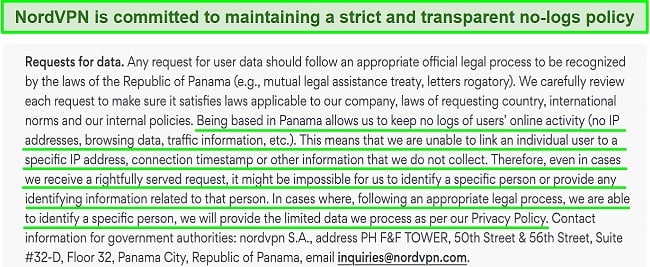
PrivateVPN also offers a no-logs policy as per its privacy statements, but I’m yet to see an independent audit from a renowned company to prove it. Its location in Sweden, a 14 Eyes country, could make you suspicious of the no-logs claims, but you’ll have to take PrivateVPN’s word for it. For this reason, NordVPN wins this round.
Privacy Policy Winner: NordVPN
12. Payments and Refunds — Both VPNs Accept Crypto Payments
This round is a tie because both VPNs offer a 30-day money-back guarantee and accept popular payment methods, as shown in the chart below.
| NordVPN | PrivateVPN | |
| Credit or Debit Cards | Visa, MasterCard, AMEX, Discover, and JCB | Visa, MasterCard, AMEX, JCB, Discover, and UnionPay |
| Paypal | ✔ | ✔ |
| Cryptocurrency | Bitcoin, Ethereum, and Ripple | Bitcoin and Ethereum |
| Other | AmazonPay, Sofort, iTunes, and Google Pay | ApplePay and Google Pay |
NordVPN supports more payment methods like AmazonPay, Sofort, and iTunes. It also accepts more cryptocurrencies than the usual Bitcoin and Ethereum. I asked for a refund through NordVPN’s live chat. The support agent offered me an extended trial, but I refused to stay. They didn’t persuade me further and approved my request, and I got my refund in 5 days.
PrivateVPN’s refund process was similar, but the live chat support agent asked me to send an email to support@privatevpn.com. I also had to provide a reason for canceling. The support team approved my email request in 4 hours, and I was reimbursed after 5 working days. Overall, I was happy with both VPNs’ payment methods and refund processes.
Payment and Refunds Winner: Tie
13. Customer Support — PrivateVPN Offers Remote Assistance
PrivateVPN wins in this category due to remote assistance. You can let the support team remotely access your system through TeamViewer and solve your problem firsthand. It’s an excellent option if you’re a visual learner instead of an FAQ reader.
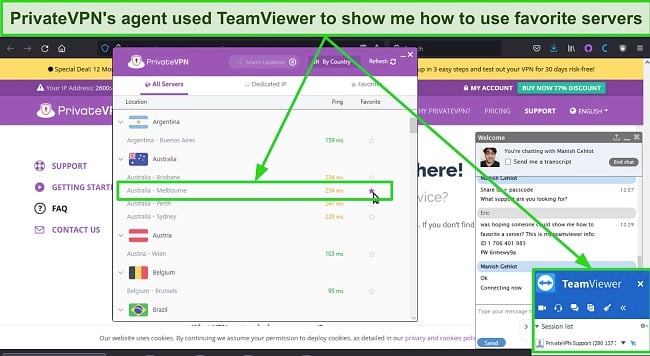
Unfortunately, NordVPN doesn’t offer this kind of personalized support. However, both VPNs include live chat and email support, which are the most common ways to get in contact. The response times were similar, though NordVPN’s email replies were much faster.
| NordVPN | PrivateVPN | |
| Live Chat | ✔ | ✔ |
| Average Response Time via Live Chat | Under 1 minute | Under 3 minutes |
| Email support | ✔ | ✔ |
| Average Response Time via Email | Within 3 hours | Up to 24 hours |
| Ticket support | ✔ | ✘ |
| Phone support | ✘ | ✘ (but includes remote assistance) |
| Online Knowledge Base | ✔ | ✔ |
NordVPN’s replies in live chat and email were detailed, prompt, and professional. At times, I had to put in extra effort to make the support agent understand what I was asking, but this was rare. In these cases, I preferred sending an email or using the in-app ticketing system.
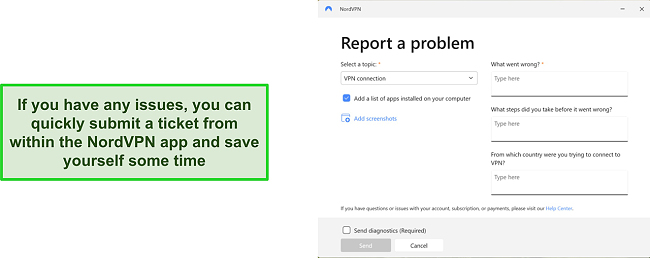
PrivateVPN’s live chat is sourced through a third-party app called LiveAgent. I wasn’t too sure about its privacy policy and used a dummy ID when it asked for my email address. The support agents answered my queries in a personalized manner.
My customer support experience with both VPNs was pleasant. PrivateVPN is better because of remote assistance. More VPNs should have this, as complex queries are hard to type and explain, especially if it’s something visual.
Customer Support Winner: PrivateVPN
And the Winner Is… NordVPN
NordVPN turned out to be a better contender than PrivateVPN. It outshined in most aspects, but PrivateVPN gave it tough competition throughout. While it’s slightly more expensive, the extra security and privacy features like dark web monitoring and double VPN servers make NordVPN worth the investment.
- Pricing: NordVPN
- Streaming: NordVPN
- Servers: NordVPN
- Speed: NordVPN
- Security: NordVPN
- Torrenting: PrivateVPN
- China: PrivateVPN
- Gaming: NordVPN
- Device Compatibility: NordVPN
- Company Jurisdiction: NordVPN
- Privacy Policy: NordVPN
- Payment and Refunds: Tie
- Customer Support: PrivateVPN
If you’re traveling to China, you should get PrivateVPN because of its ‘Stealth’ mode. While NordVPN also includes obfuscated servers, it doesn’t reliably work in restrictive countries. Despite its limited network, PrivateVPN still surprisingly works with most streaming services and checks all the boxes for a well-rounded VPN.
Overall, NordVPN is better value for money because of the sheer number of features it offers. It also ranks high on the top-rated VPNs in 2025 list. Getting its 2-year + 3 months plan gives you a % discount, and you can try NordVPN risk-free with its 30-day money-back guarantee. I got my refund in 5 business days after submitting a request via live chat.
Overall Winner: NordVPN
The Best VPNs to Try in 2025
Editor's Note: We value our relationship with our readers, and we strive to earn your trust through transparency and integrity. We are in the same ownership group as some of the industry-leading products reviewed on this site: ExpressVPN, Cyberghost, Private Internet Access, and Intego. However, this does not affect our review process, as we adhere to a strict testing methodology.

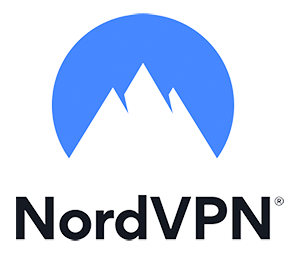
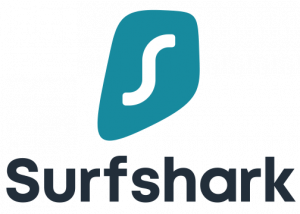



Leave a Comment
Cancel